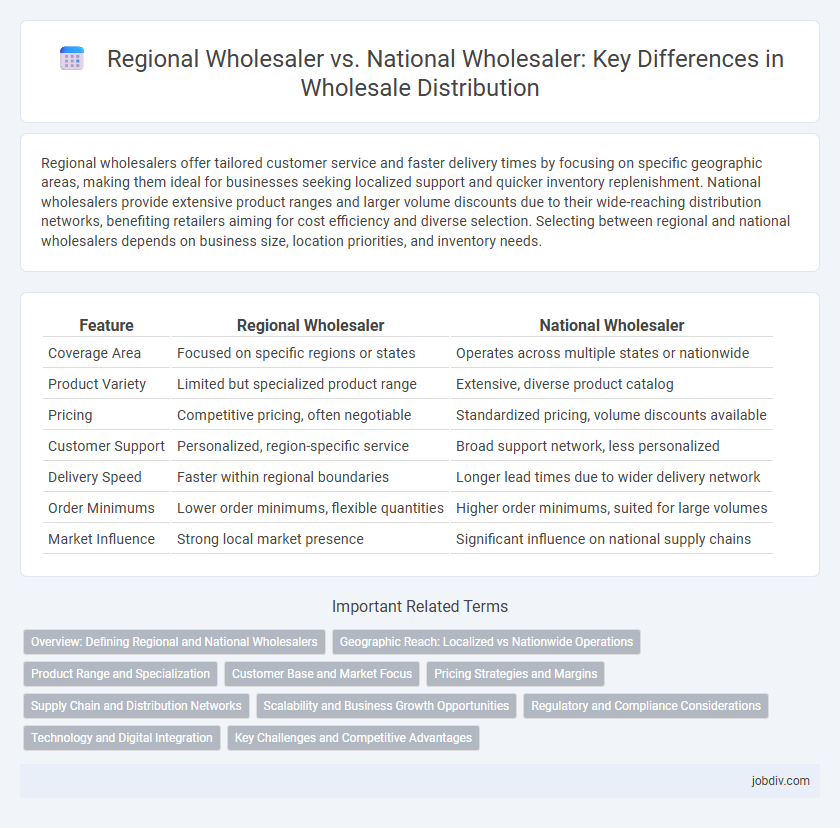Regional wholesalers offer tailored customer service and faster delivery times by focusing on specific geographic areas, making them ideal for businesses seeking localized support and quicker inventory replenishment. National wholesalers provide extensive product ranges and larger volume discounts due to their wide-reaching distribution networks, benefiting retailers aiming for cost efficiency and diverse selection. Selecting between regional and national wholesalers depends on business size, location priorities, and inventory needs.
Table of Comparison
| Feature | Regional Wholesaler | National Wholesaler |
|---|---|---|
| Coverage Area | Focused on specific regions or states | Operates across multiple states or nationwide |
| Product Variety | Limited but specialized product range | Extensive, diverse product catalog |
| Pricing | Competitive pricing, often negotiable | Standardized pricing, volume discounts available |
| Customer Support | Personalized, region-specific service | Broad support network, less personalized |
| Delivery Speed | Faster within regional boundaries | Longer lead times due to wider delivery network |
| Order Minimums | Lower order minimums, flexible quantities | Higher order minimums, suited for large volumes |
| Market Influence | Strong local market presence | Significant influence on national supply chains |
Overview: Defining Regional and National Wholesalers
Regional wholesalers operate within a specific geographic area, offering tailored services and localized inventory to meet the demands of businesses in that region. National wholesalers maintain a broad distribution network across multiple regions or the entire country, leveraging extensive logistics and economies of scale to supply a diverse range of products. The primary distinction lies in scope and reach, with regional wholesalers focusing on specialized market needs and national wholesalers emphasizing wide coverage and volume efficiency.
Geographic Reach: Localized vs Nationwide Operations
Regional wholesalers typically concentrate on serving specific geographic areas, enabling them to offer tailored services and quicker delivery times within localized markets. National wholesalers operate across the entire country, leveraging extensive distribution networks to supply a broad range of products nationwide. Geographic reach influences inventory management, logistics strategies, and customer relationships, distinguishing localized expertise from comprehensive market coverage.
Product Range and Specialization
Regional wholesalers typically offer a more specialized product range tailored to local market demands, allowing them to provide niche or region-specific items. National wholesalers maintain a broader product range, focusing on volume and variety to serve diverse markets across multiple regions. This specialization difference impacts inventory management, supplier relationships, and customer service strategies in wholesale operations.
Customer Base and Market Focus
Regional wholesalers concentrate on serving a specific geographic area, targeting local retailers and businesses with tailored inventory that meets regional demand patterns. National wholesalers operate across multiple states or the entire country, offering a broad product range designed to appeal to a diverse customer base and maximize market penetration. This geographic scope directly influences their logistics, pricing strategies, and customer relationship management approaches.
Pricing Strategies and Margins
Regional wholesalers often implement localized pricing strategies that reflect specific market demand and competition, resulting in variable profit margins tailored to regional economic conditions. National wholesalers leverage bulk purchasing and standardized pricing models to achieve cost efficiencies, enabling them to maintain lower margins but higher volume sales across widespread markets. Pricing strategies between regional and national wholesalers directly affect margin structures, with regional players prioritizing flexibility and national players emphasizing scale-driven cost advantages.
Supply Chain and Distribution Networks
Regional wholesalers optimize supply chains by focusing on localized distribution networks, enabling faster delivery times and reduced transportation costs. National wholesalers maintain extensive distribution networks across multiple states or countries, leveraging economies of scale for bulk purchasing and centralized inventory management. Efficient coordination between suppliers, warehouses, and retailers is crucial for both to ensure product availability and meet market demands effectively.
Scalability and Business Growth Opportunities
Regional wholesalers offer targeted market penetration with localized customer relationships, allowing for faster adaptability and tailored inventory management within specific geographic areas. National wholesalers leverage extensive distribution networks and higher purchasing power to achieve economies of scale, supporting large-volume transactions and broader market reach. Scalability for regional wholesalers is often limited by territorial constraints, whereas national wholesalers can drive substantial business growth through diversified market presence and centralized operations.
Regulatory and Compliance Considerations
Regional wholesalers must navigate state-specific regulations, including licensing, tax requirements, and distribution laws, which vary significantly across jurisdictions. National wholesalers face the complexity of complying with federal regulations such as the Food and Drug Administration (FDA), Environmental Protection Agency (EPA), and the Federal Trade Commission (FTC) alongside diverse state mandates. Both require robust compliance programs to mitigate risks related to product safety, labeling, and reporting standards to avoid penalties and ensure seamless operations nationwide or within specific regions.
Technology and Digital Integration
Regional wholesalers leverage localized supply chain technologies and tailored digital platforms to optimize inventory management and enhance customer relationships within specific markets. National wholesalers invest in large-scale ERP systems and advanced data analytics to synchronize operations across multiple regions, enabling real-time tracking and centralized digital storefronts. The integration of AI-driven forecasting tools in both regional and national models improves demand prediction, but national wholesalers benefit from greater economies of scale in technology deployment.
Key Challenges and Competitive Advantages
Regional wholesalers face key challenges such as limited geographic reach and dependency on local market conditions, which can restrict growth opportunities compared to national wholesalers. However, their competitive advantages include stronger relationships with local retailers, quicker response times, and tailored service offerings that better meet regional demand. National wholesalers benefit from economies of scale, broader product assortments, and extensive distribution networks, but often struggle with higher operational complexity and less personalized customer interactions.
Regional Wholesaler vs National Wholesaler Infographic

 jobdiv.com
jobdiv.com